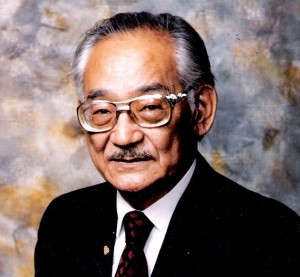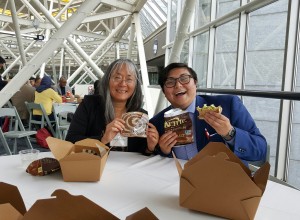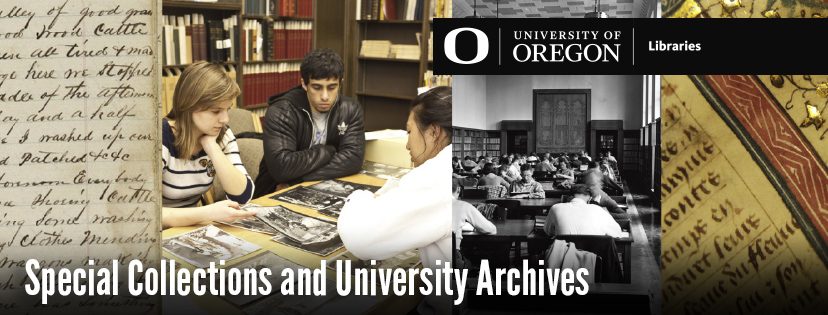Inspiring Action and Igniting Justice Symposium: The Legacy of UO Alumnus Minoru Yasui

“There is no amount of money that can ever repay us for the kinds of things that we underwent. Who could put a price tag upon that kind of confinement?” – Minoru Yasui
In honor of Asian American and Pacific Islander Heritage Month, the University of Oregon Special Collections and University Archives is featuring events and student organizations that serve Asian Americans on and off campus. On April 23 at the New World Trade Center in Portland, Oregon, I was privileged enough to attend the Minoru Yasui Inspiring Action and Igniting Justice Symposium. The event was meant to honor University of Oregon Alumnus and activist Minoru Yasui who was the first Japanese American to graduate from the UO Law School and was an individual who protested discriminatory Executive Order 9066 during World War II. The symposium not only celebrated the life of Minoru Yasui and his fight for social justice, but also his United States Medal of Freedom that was recently awarded to him, which is the highest honor a civilian can receive in the US.

Although you can learn more about Minoru Yasui in our previous blog “World War II and the National Japanese American Student Relocation Council,” here are a few aspects of his life that were highlighted throughout the event. Minoru Yasui was a second generation Japanese American in the United States and attended the University of Oregon as an undergraduate and then became the first Japanese American to graduate from the UO Law School in 1938. Shortly after the attack on Pearl Harbor in 1941, Executive Order 9066 was enforced and demanded a curfew on individuals of Japanese descent, in addition to forced removal from their homes to internment camps. During this period, Minoru Yasui was practicing law in Portland and disagreed with these unjust regulations brought about by the US government because he was a US citizen and deserved to be treated as such. As a response to this discriminatory order, he decided to protest by leaving his law office at the precise moment when curfew began. He walked through the streets of Portland for three hours with the intention of attracting the attention of authorities. He was eventually arrested for breaking curfew and his case eventually reached the Supreme Court, but his conviction was upheld. These experiences of discrimination fueled his dedication for social justice and his fight for reparations for Japanese Americans because of Executive Order 9066. He died on November 12, 1986 and on August 10, 1988, President Reagan granted a redress of $20,000 and a formal apology to every individual of Japanese ancestry that was incarcerated in the internment camps during World War II.
The symposium began with a welcome from Peggy Nagae who is the co-founder of the Min Yasui Tribute project and who was also the lead attorney in his coram nobis case. She was also appointed by President Clinton in 1996 to the Civil Liberties Public Education Fund Board and is also a past Assistant Dean at the University of Oregon School Of Law. She briefly discussed Minoru Yasui’s life and the long and strenuous application for his United States Medal of Freedom. It was amazing listening to her speak about the hard work being done and the justice that was being served while I sat next to a woman who had been interned during Executive Order 9066. After her speech, Oregon Senator Ron Wyden, who also advocated for the United States Medal of Freedom for Minoru Yasui during the application process, spoke about Minoru Yasui’s life of activism and resilience.
After the opening session, we broke into our first block of panels and workshops. I attended the “Cross Cultural Activism” session that discussed how groups serving different ethnic communities can work together to continue Minoru Yasui’s legacy and create social change. The session included representatives from a wide range of activist groups in Portland such as ChangeLab, Black Lives Matter Portland, Muslim Educational Trust (MET), and Causa, which is Oregon’s (im)migrant rights organization. A major topic of discussion was gentrification in Portland. According to one of the representatives, 1 in 4 African Americans are homeless in Portland and the city is now considered the “whitest city” in the United States. The panel discussed how other minorities outside of the African American community can be supportive by helping cross-culturally in order to prevent further injustice.
After the first session, we broke for lunch and I had the honor of sitting with Minoru Yasui’s daughter Holly Yasui. I was even able to get a humorous photo with her and our sandwiches. During the lunch, we discussed various topics, including the previous session we both attended, her life in Mexico, and how her and her father used to argue about the best way to bring about positive change. Her father preferred to use the law and she preferred more “radical” approaches such as protests, sit-ins, media, and others.

The second session I attended was titled, “Education: Roots to Results” and included panelists such as: the Education Manager for the Oregon Nikkei Endowment in Portland, a performing artist/educator, a Portland State University professor, and a middle school teacher. The overall aim of the panel was to provide current and future educators or those involved in education information on how to diversify their curriculum in meaningful and respectful ways. The performing artist/educator shared how she puts on a cultural performance every year with her elementary students in order to educate her students about different cultures in an interactive way. The middle school teacher shared her experience working in Hood River where the Yasui’s owned various businesses before their eventual removal because of Executive Order 9066. As a social studies middle school teacher, she incorporated the history of Minoru Yasui and his family when teaching the children about Hood River’s history. Her and her students also created a video that shared the story of Minoru Yasui and it was submitted as part of the Medal of Freedom application.
Following the final session, we regathered as a large group once more for a screening of a documentary in progress by Holly Yasui about her father’s life titled, “Never Give Up!: Minoru Yasui and the Fight for Justice.” Although incomplete, the film was both intimate and inspiring since it featured early interviews with Minoru Yasui, interviews with his surviving relatives, and current activists. In addition, it will eventually be narrated by actor and activist George Takei. Overall, I greatly enjoyed my participation in the symposium that celebrated a fellow duck’s incredible life of activism and resilience that inspires others to continue his work in the fight for social justice.

Paulla Santos
Student Research Assistant

